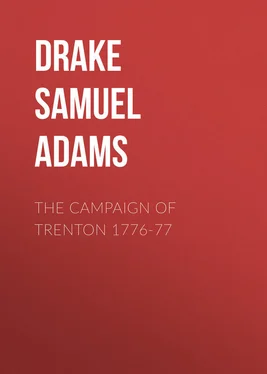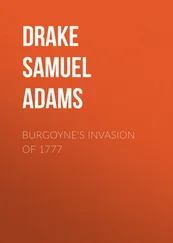Samuel Drake - The Campaign of Trenton 1776-77
Здесь есть возможность читать онлайн «Samuel Drake - The Campaign of Trenton 1776-77» — ознакомительный отрывок электронной книги совершенно бесплатно, а после прочтения отрывка купить полную версию. В некоторых случаях можно слушать аудио, скачать через торрент в формате fb2 и присутствует краткое содержание. Жанр: foreign_antique, foreign_prose, на английском языке. Описание произведения, (предисловие) а так же отзывы посетителей доступны на портале библиотеки ЛибКат.
- Название:The Campaign of Trenton 1776-77
- Автор:
- Жанр:
- Год:неизвестен
- ISBN:нет данных
- Рейтинг книги:3 / 5. Голосов: 1
-
Избранное:Добавить в избранное
- Отзывы:
-
Ваша оценка:
- 60
- 1
- 2
- 3
- 4
- 5
The Campaign of Trenton 1776-77: краткое содержание, описание и аннотация
Предлагаем к чтению аннотацию, описание, краткое содержание или предисловие (зависит от того, что написал сам автор книги «The Campaign of Trenton 1776-77»). Если вы не нашли необходимую информацию о книге — напишите в комментариях, мы постараемся отыскать её.
The Campaign of Trenton 1776-77 — читать онлайн ознакомительный отрывок
Ниже представлен текст книги, разбитый по страницам. Система сохранения места последней прочитанной страницы, позволяет с удобством читать онлайн бесплатно книгу «The Campaign of Trenton 1776-77», без необходимости каждый раз заново искать на чём Вы остановились. Поставьте закладку, и сможете в любой момент перейти на страницу, на которой закончили чтение.
Интервал:
Закладка:
The resistance met with by the enemy's turning corps may be guessed from what an officer [3] Captain Harris, of the Fifth Foot.
who took part has to say of it. "We have had," he goes on to relate, "what some call a battle, but if it deserves that name it was the pleasantest I ever heard of, as we had not received more than a dozen shots from the enemy, when they ran away with the utmost precipitation."
Washington re-enforces.
Though not in personal command when the action began, Washington crossed over to Brooklyn in time to see his broken and dispirited battalions come streaming back into their works. Fearing the worst, he had called down two of his best regiments (Shee's and Magaw's) from Harlem Heights, and Glover's from the city, to reënforce the troops then engaged on Long Island, but as has already been pointed out, reënforcing in this manner was out of the question. By making a rapid march, the Harlem troops reached the ferry in the afternoon, after firing had ceased. They were, however, ferried across the next morning.
28th and 29th.
These movements would indicate a resolution to hold the Brooklyn lines at all hazards, and were so regarded, but during the two days subsequent to the battle, while the enemy was closing in upon him, Washington changed his mind, preparations were quietly made to withdraw the troops, while still keeping up a bold front to the enemy, and on the night of the 29th the army repassed the East River without accident or molestation.
Having thus cleared Long Island, the British extended themselves along the East River as far as Newtown, that river thus dividing the hostile camps throughout its whole extent. And though New York now lay quite at his mercy, Howe refrained from cannonading it, for the same reason as Washington did from shelling Boston; namely, that of securing the city intact a little later.
In spite of this brilliant opening of the campaign, and outside of the noisy subalterns who were making their début in war, it was felt that the British army, fresh, numerous, and splendidly equipped, had acquitted itself most ingloriously in permitting the Americans to make their retreat from the island as they had, when the event of an assault must probably have been most disastrous to them.
Losses so far.
On the other side defeat had seriously affected the morale of the Americans. Fifteen hundred men had been lost on Long Island. A great many more were now being lost through desertion. In Washington's own words the unruly militia left him by companies, half regiments or whole regiments, leaving the infection of their evil example to work its will among the well-disposed.
New York to be held.
Although the defence of New York had thus broken down at its vital point, a majority of generals favored still holding the city. To this end Washington now divided his forces, leaving 4,000 in the city, posting 6,500 at Harlem Heights, and 12,000 at Fort Washington and King's Bridge. Though furnished by a general officer, [4] General Glover's estimate.
these figures really include the sick, who were estimated at nearly 10,000, as well as the large number detached on extra duty. Washington, himself, vaguely estimated his effective force at under 20,000 at this time.
As thus arranged, Harlem Heights, in the centre, became the army headquarters for the time being, Washington, by one of those little accidents that sometimes arrest a passing thought, occupying the house [5] The Morris House is still standing at 160th street, near 10th avenue, N. Y., and is now occupied by Gen. Ferdinand P. Earle.
of the same lady who had formerly refused the offer of his hand in marriage, Miss Mary Phillipse, later to accept that of Colonel Roger Morris, his old companion in arms during Braddock's fatal campaign.
IV
NEW YORK EVACUATED
Howe seems to have thought that so long as Washington remained in New York he might be bagged at leisure. In no other way can his dilatory proceedings be accounted for. Sixteen days passed without any demonstration on his part whatever. Meantime, however, the steady extension of his lines toward Hell Gate had operated such a change of opinion in the American camp that the decision to hold the city was now reconsidered, and the evacuation fixed for September 15. It was seen that the storm centre was now shifting over toward the American communications, but just where it would break forth was still a matter of conjecture.
Howe was fully informed of what was going on by his royalist friends in the city, and like the cat watching the wounded mouse while it is recovering its breath, he prepared to spring at the moment his enfeebled adversary should show signs of returning animation.
British seize New York.
All being ready, on the very day fixed for the evacuation, Sir Henry Clinton crossed the East River in boats from Newtown Bay to Kipp's Bay, with 4,000 men, landed without opposition, owing to a disgraceful panic which seized the Americans posted there for just such an emergency, and thus thrust himself in between the Americans in the city and those at Harlem Heights. Thus cut off, it was only at the greatest risk of capture that the garrison below was saved, with the loss of much artillery, tents, baggage, and stores, by marching out on one road while the enemy were marching in on another, [1] A British brigade was sent down to the city in the course of the evening.
as Clinton had immediately pushed on up the island, at the heels of the retreating Americans.
A captain of British grenadiers describes what took place after the landing, in the following animated style:
Конец ознакомительного фрагмента.
Текст предоставлен ООО «ЛитРес».
Прочитайте эту книгу целиком, купив полную легальную версию на ЛитРес.
Безопасно оплатить книгу можно банковской картой Visa, MasterCard, Maestro, со счета мобильного телефона, с платежного терминала, в салоне МТС или Связной, через PayPal, WebMoney, Яндекс.Деньги, QIWI Кошелек, бонусными картами или другим удобным Вам способом.
1
As will be seen farther on, New England had no strategic value in this relation.
2
Continentals.This term, for want of a better, arose from the practice of speaking of the colonies, as a whole, as the Continent, to distinguish them from this or that one, separately.
4
General Lee had been sent to New York as early as January. He took military possession of the city, with militia furnished by Connecticut.
5
In a private letter General Knox indignantly styles it "this rabble army."
6
"Being fully persuaded that it would be presumption to draw out our young troops into open ground against their superiors, both in numbers and discipline, I have never spared the spade and pickaxe." — Letters.
1
These were Poor's, Patterson's, Greaton's, and Bond's Massachusetts regiments on April 21, two New Jersey, two Pennsylvania, and two New Hampshire battalions on the 26th. See Burgoyne's Invasion of this series for an account of the Canada campaign.
2
The numbers are estimated by General Heath ( Memoirs , p. 51) as high as 40,000. He, however, deducts 10,000 for the sick, present. They were published long after any reason for exaggeration existed.
Читать дальшеИнтервал:
Закладка:
Похожие книги на «The Campaign of Trenton 1776-77»
Представляем Вашему вниманию похожие книги на «The Campaign of Trenton 1776-77» списком для выбора. Мы отобрали схожую по названию и смыслу литературу в надежде предоставить читателям больше вариантов отыскать новые, интересные, ещё непрочитанные произведения.
Обсуждение, отзывы о книге «The Campaign of Trenton 1776-77» и просто собственные мнения читателей. Оставьте ваши комментарии, напишите, что Вы думаете о произведении, его смысле или главных героях. Укажите что конкретно понравилось, а что нет, и почему Вы так считаете.












